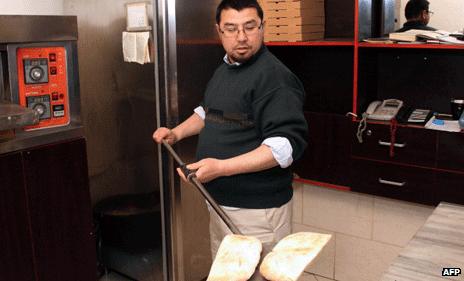The Uighur from Guantanamo cooking pizza in Albania
- Published

Abu Bakker Qassim is a pizza chef like no other. A Uighur from north-western China, he was detained in Pakistan in 2001, imprisoned at Guantanamo, and is now cooking halal Italian food in Albania.
It is an extraordinary journey, and one which has left Qassim an exile, separated permanently from his family in China.
When he first left the Uighur homeland, Xinjiang, he was heading for Turkey, where he planned to get a job in a leather factory, and then send for his family.
Crossing first into Central Asia he made his way south to Pakistan, where he applied for a visa to travel through Iran. While waiting, he says, he went to stay in a "Uighur village" across the border in Afghanistan.
But the village happened to be near Tora Bora, and this was the autumn of 2001, not long after the 9/11 attacks. The US starting bombing suspected militant targets, one of which, it appears, was the "Uighur village".
Qassim and his friends hid at first in caves, then crossed snow-covered mountain passes to Pakistan. Villagers greeted them as guests - then sold them for bounty to US forces.
"We were happy when we were handed over to the Americans," says Qassim. "They usually help Uighurs. They said, 'We know who you are. China is our common enemy - we'll set you free soon.'"
He spent six months on a US air force base in Kandahar, then four years in Guantanamo Bay, with some 20 other Uighur men.
By 2005, US officials had worked out that Qassim posed no threat and could be released, but it was not obvious what to do with him, and others now classified as NLEC - "No Longer Enemy Combatant".
At one point, the US authorities allowed Chinese officials to visit the men.
"The Chinese authorities said that the Americans were facing a huge crisis and they couldn't feed us," he says. "They said, 'Let us take you back to China and we will take care of you.'
"At that time I would have rather stayed in Guantanamo than have gone back to China."
The main reason he left in the first place was to escape China's harsh treatment of the Muslim Uighur minority.
Former US deputy assistant secretary of state Randall Schriver has since described the situation Qassim and the other 21 Guantanamo Uighurs as "nothing short of 'tragic'", external.
Qassim acknowledged at Guantanamo that in exchange for food and accommodation at the "Uighur village" in Afghanistan he had trained to fight, but the US authorities accepted that they were training to "fight the Chinese" not the Americans or any of their allies.
It was a year before Albania stepped forward to offer Qassim and four companions asylum.
"I couldn't even find Albania on a map," says Qassim.
Knowing only that Albania was a communist state like the one they had fled, at first they refused to go.
But when they were persuaded that Albania had been a democracy for 15 years - and that its population was 70% Muslim - they swapped their orange jumpsuits for T-shirts, jeans and white trainers and, still handcuffed, stepped aboard a military plane to Europe.
They flew east for 12 hours, and as the plane touched down Qassim began to fear he had been taken back to China.
"We thought they had lied to us," he says.
"We were looking out the back of the airplane, into the dark. There was no light. Then we saw that a car had come, and we saw several people come out who looked like Europeans, wearing suits."
As promised, the Albanian authorities offered the men housing, welfare and the right to work. They set about fitting in to this new society.
"My lawyer advised me to learn Albanian and to learn something that would be useful for everyone. I decided to learn to make pizzas," Qassim says.
"I knew that Albanians love pizza and I love cooking, so it was very easy for me to learn."
Pizza of course, is "not exactly a speciality of my country", as he puts it, but he has taken to his new profession with gusto, experimenting with new recipes, and of course only halal ingredients.
But he still lives as a refugee. He and the other Uighurs from Guantanamo have not been given Albanian citizenship or passports, so cannot travel abroad.
On his release from Guantanamo, Qassim was able to speak with his wife for the first time in five years, but he has not been able to see her, or their three children - the last of whom, a daughter, was born only after he left China.
He appealed to both the Albanian government and the UN to bring them to Albania but China has refused to comply.
"It's very, very difficult, they are having problems because of me. Police visit them often, they are asked questions about our conversations," he says.
Qassim has given up hope of ever seeing them again, except via Skype.
Last year, with his wife's agreement he got divorced and has since remarried - to another Uighur woman already living in Europe. Earlier this year his new wife gave birth to a daughter, making him a father for the fourth time.
Abu Bakker Qassim spoke to Outlook on the BBC World Service. Listen to the programme here.